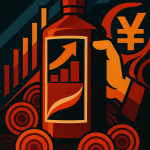Key Points
- The China Securities Regulatory Commission (CSRC) is set to overhaul its securities firm classification rules on August 22, 2025, fundamentally changing evaluation, ranking, and regulation.
- The new framework shifts focus from just profits to how well a firm serves the real economy and its functional performance, alongside risk management, compliance, and business development.
- It aims to encourage specialization, rewarding firms that attract medium-to-long-term capital and build strong wealth management capabilities, especially benefiting small and medium-sized institutions.
- The reforms include stricter penalties for misconduct and a refined system for direct classification downgrades, while also offering reduced point deductions for firms that proactively compensate affected parties or apply for administrative enforcement undertaking (先行赔付).

China’s new regulations for securities firm classification are set to shake things up for investors and financial institutions operating in the world’s second-largest economy.
On August 22, 2025, a fresh set of rules from the China Securities Regulatory Commission (CSRC) will officially kick in, fundamentally changing how securities companies are evaluated, ranked, and regulated.
This isn’t just a minor tweak.
It’s a strategic overhaul designed to reward excellence, punish misconduct, and steer the entire industry towards higher-quality, specialized services.
Let’s break down what’s happening and why it matters.
Why the Big Change? The Guiding Principles Behind the CSRC’s Move
So, what’s the big idea behind this regulatory facelift?
The CSRC laid out a clear strategy, and it’s not just about more rules for the sake of it.
The revision is guided by three core principles:
- A Goal-Oriented Approach: The main goal is to strengthen regulation, prevent systemic risks, and push for high-quality development in the capital market. The CSRC is using this new framework as a “baton” to guide firms in the right direction.
- Maintaining Overall Stability: This isn’t a total teardown. The existing evaluation system is considered mature, so the CSRC is focusing on localized improvements and moderate optimizations rather than a radical overhaul. Think of it as a significant renovation, not a rebuild.
- Better Coordination, Less Bureaucracy: In a move that firms will appreciate, the CSRC is working closely with the Securities Association of China (Zhongguo Zhengquan Ye Xiehui 中国证券业协会) to review and integrate evaluation metrics. The aim is to avoid redundant reporting and ease the compliance burden on the industry.

Find Top Talent on China's Leading Networks
- Post Across China's Job Sites from $299 / role
- Qualified Applicant Bundles
- One Central Candidate Hub
Your First Job Post Use Checkout Code 'Fresh20'

The Nitty-Gritty: 4 Major Changes to China’s Securities Firm Regulations
The official document title has even changed from “Administrative Measures for the Classification and Supervision…” to “Administrative Measures for the Classification Evaluation of Securities Companies.”
That subtle shift hints at a deeper change in focus. Here are the key revisions:
1. A New Scorecard: Redefining “Good Performance”
The old evaluation model is out. The new framework will assess firms based on four pillars:
- Risk management capability
- Continuous compliance status
- Business development
- Functional performance
That last one—functional performance—is a big deal. It signals a shift from just looking at profits to evaluating how well a firm serves the real economy and fulfills its role in the broader financial ecosystem.
2. Pushing for Quality and Specialization
The CSRC is tweaking the bonus point system to guide firms toward higher-quality operations.
The focus is on rewarding companies that excel in specific, valuable areas, such as:
- Attracting medium and long-term capital into the market.
- Building strong wealth management service capabilities.
Crucially, the scope for bonus points has been expanded. This is a direct shot at encouraging small and medium-sized institutions to stop trying to be everything to everyone and instead carve out a niche by building on their unique strengths.
3. The Hammer Comes Down on Bad Behavior
The message from the CSRC is crystal clear: major malpractices will be cracked down on, hard.
- The rules for getting a direct downgrade in classification have been refined, maintaining a strong deterrent against serious violations.
- Point deductions for “qualification penalties” have been appropriately increased.
- Deductions for administrative penalties have been optimized with a new graded system, ensuring the punishment fits the crime.
This creates a comprehensive penalty system where regulatory actions have real, painful consequences for a firm’s official rating.
4. A Path to Redemption for Proactive Firms
It’s not all stick and no carrot.
The new rules also introduce a bit of leniency for firms that take responsibility for their actions.
For example, companies suspected of violations can receive reduced point deductions if they:
- Actively apply for an administrative enforcement undertaking.
- Proactively carry out 先行赔付 (qianxing peifu), which is a system of pre-emptive compensation to affected parties.
This incentivizes firms to make things right quickly, rather than digging in for a long fight.
- Risk management capability
- Continuous compliance status
- Business development
- Functional performance (new emphasis: serving the real economy)
- Attracting medium and long-term capital
- Building strong wealth management capabilities
- Encouraging specialization, especially for small and medium-sized institutions
- Refined rules for direct classification downgrades
- Appropriately increased point deductions for “qualification penalties”
- Graded system for administrative penalties
What This Means for the Future of China’s Capital Market
This isn’t just bureaucratic shuffling. It’s a calculated move to shape the future of China’s financial industry.
The CSRC’s end game is to foster the growth of first-class investment banks and institutions that can compete on a global scale.
For investors, this could lead to a more stable, reliable, and transparent market with more specialized and professional service providers.
For securities firms, the directive is clear: manage risk effectively, maintain impeccable compliance, and find a specialized niche where you can deliver real value.
Ultimately, this overhaul of China’s securities firm classification system is a critical step in the nation’s broader mission to strengthen its capital markets and ensure they better serve the real economy.

ExpatInvest China
Grow Your RMB in China:
- Invest Your RMB Locally
- Buy & Sell Online in CN¥
- No Lock-In Periods
- English Service & Data
- Start with Only ¥1,000

References & Further Reading
- The China Securities Regulatory Commission has released the “Decision on Amending the Administrative Measures for the Classification and Supervision of Securities Companies” – China Securities Regulatory Commission
- The China Securities Regulatory Commission solicits public opinions on the “Administrative Measures for the Classification and Supervision of Securities Companies (Revised Draft)” – China Securities Regulatory Commission
- Opinions of the State Council on Strengthening Regulation, Preventing Risks, and Promoting High-Quality Development of the Capital Market – The State Council of the People’s Republic of China





